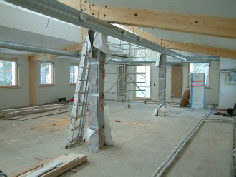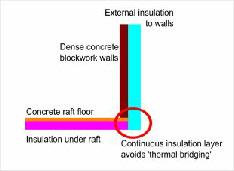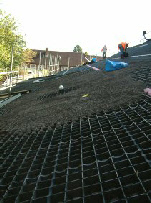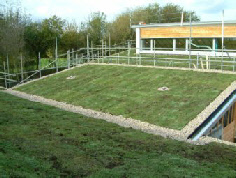

Make a point of visiting us weekly!
Centre for Disability Studies
Disability Essex
Disability Essex
Centre for Disability Studies
34 Rocheway,Rochford
Essex SS4 1DQ
Telephone 0844 412 1771 Facsimile 0844 880 0614
www.disabilityessex.org
34 Rocheway,Rochford
Essex SS4 1DQ
Telephone 0844 412 1771 Facsimile 0844 880 0614
www.disabilityessex.org



Introduction
When we visited the ‘Disability Centre’ in Rocheway we were given a run-down of the building by Stuart Kirk, the Project Manager for the Centre. If you are a regular reader of Rochford Life you will know that people are important to us. Who is the man who presides over this facility? You may be surprised to read in this very candid interview that Stuart considers himself a ‘dogsbody’. Here he very openly shares his recent years with us and we have appreciated the opportunity to include this very encouraging account. We hope you’ll also find it so.
3. The Man
RL: Stuart, can we come back to you? What is your history that has brought you here?
Stuart: I have spent the majority of my working life in quality control, an industrial chemist. In the year 2000 my GP signed me off with stress, which happens to a lot of people. Contrary to popular belief being signed off is not the end but the beginning.
I was still on the slippery slope towards a breakdown and I was out of work for five years. Another project that the Charity had was to take people who were on incapacity benefit, economically inactive, and then help reskill them into what is called access auditing. I had never heard of it before. We were still based in Chelmsford in those days.
By about 2005 I was thinking of returning to work. I wasn’t ready for work and I felt I couldn’t go back to what I used to do but I was good with numbers and with computers, so I thought about training up to become a self-employed Book-keeper, to work my own hours, choose my own customers; that was the theory anyway. My disability advisor at the Job Centre heard about this course for access auditing.
This was a thirteen week course, funded by Europe, so that it would cost me nothing; it gave me something to do. I decided to do it. I had a bit of a struggle getting my head round some of the disability concepts. I had nothing to do with disability beforehand, I’d never heard of the charity before. Then in 2006, while I was still out of work, the Charity said we’ve got a contract to do an Access Audit on County Hall, which is quite a big mass of buildings, it will take four of you three months, do you want the job? We’ll pay you. So I said OK, I’ll take your money, I’ve got nothing else to do, so I was one of two teams going round County Hall auditing it.
When it was all finished the Chief Executive said I need somebody to write the report. Do you want the job? I’ll pay you for three months to do it. So I said, OK, I’ll take your money, and so wrote the report, several thousand pages of it. So in Autumn 2006 I handed the report in and the Chief Executive said, we’ve got this building and I need an assistant, do you want the job? At the time I had no idea what the job would entail and originally it was going to be a one year contract to help co-ordinate this new building which, at the time, was going to be in Chelmsford.
Things didn’t work out the way they should have done in Chelmsford and I did all sorts of time-filling jobs, including attending committee meetings and anything else that came up, so when anyone used to ask me what is my job, I answered, dogsbody! Sitting on the committees and running all round the place, in hindsight gave me a good insight into how the voluntary sector works and who’s who.
Then we moved down to Rochford as soon as we got confirmation that we had this plot of land. We rented two classrooms in the Adult Community College next door for nearly two years whilst this building was being put up, so that we could supervise and I could be hands-on involved in overseeing the project.
Also as part of my Access work we picked up a contract to do Access Audits as part of the Government’s Access to Work Scheme. If there is a person who is unemployed or due to become unemployed but who has a disability then the Government has this scheme which can help fund some of the extra costs that the employer might incur. Somebody has to go around and look at the problems that the individual might experience and come up with a way round them. For instance if there is a scooter mobility user and there are steps – can you put in a ramp, where can you put a ramp in? Or suppose there is an office block and you have a wheelchair user on the fourth floor, how do you get them out of the building in an emergency? Evacuation chair. That is down to the employer to fund rather than the Job Centre but somebody has to think about these facilities that need to be put in place.
Every job is different and so I’m still on a variety of different jobs. I’m still a dogsbody! I really don’t have a job description. Whatever needs to be done I do it. For example,I said we were involved in mobility scooter training. Tomorrow I’m off to Edgbaston to meet with ROSPA to discuss the safety implications of this and try to move the whole thing forward.
We have a lot of irons in the fire and people aren’t aware of the many things going on under the surface in organisations such as this. I’m one of the three full-time employees here doing whatever needs doing.
RL: Stuart, a one line description of this site and then its activity?
Stuart: The building is an exemplar of how a building can be made accessible and it serves as the office and training centre of the Charity. The Charity serves to help people with disabilities, their families and carers throughout Essex (as it has done for the last sixty years).
RL: OK, one more thing: to summarise, what can you offer?
Stuart: Right, first the Training Room hire aimed at Community Clubs, priority obviously for disability issues, subject to availability, fifty pounds for the evening or half day for what is a small conference room.
Second, mobility scooter training. We have sixty places free of charge for anyone who wants to learn how to use one; bring your own or use one of ours.
I also go into schools to talk about disability related issues. When local schools have done citizenship days we’ve gone in and done the disability side of things.
Anything involving disabilities, providing information – we’ve got information on the web-sites, for all across county, and we have our telephone helpline for any information you want. We’ve helped people who have had bad experiences in respect of disability in their employment.
We have a load of other projects that we’re trying to get off the ground. We are planning to get a solicitor to come in once a month to hold an open surgery on any disability-related issue, so watch this space. Much more to come!
To return to 1. The Charity - CLICK HERE. To return to 2. The Building - CLICK HERE
When we visited the ‘Disability Centre’ in Rocheway we were given a run-
3. The Man
RL: Stuart, can we come back to you? What is your history that has brought you here?
Stuart: I have spent the majority of my working life in quality control, an industrial chemist. In the year 2000 my GP signed me off with stress, which happens to a lot of people. Contrary to popular belief being signed off is not the end but the beginning.
I was still on the slippery slope towards a breakdown and I was out of work for five years. Another project that the Charity had was to take people who were on incapacity benefit, economically inactive, and then help reskill them into what is called access auditing. I had never heard of it before. We were still based in Chelmsford in those days.
By about 2005 I was thinking of returning to work. I wasn’t ready for work and I felt I couldn’t go back to what I used to do but I was good with numbers and with computers, so I thought about training up to become a self-
This was a thirteen week course, funded by Europe, so that it would cost me nothing; it gave me something to do. I decided to do it. I had a bit of a struggle getting my head round some of the disability concepts. I had nothing to do with disability beforehand, I’d never heard of the charity before. Then in 2006, while I was still out of work, the Charity said we’ve got a contract to do an Access Audit on County Hall, which is quite a big mass of buildings, it will take four of you three months, do you want the job? We’ll pay you. So I said OK, I’ll take your money, I’ve got nothing else to do, so I was one of two teams going round County Hall auditing it.
When it was all finished the Chief Executive said I need somebody to write the report. Do you want the job? I’ll pay you for three months to do it. So I said, OK, I’ll take your money, and so wrote the report, several thousand pages of it. So in Autumn 2006 I handed the report in and the Chief Executive said, we’ve got this building and I need an assistant, do you want the job? At the time I had no idea what the job would entail and originally it was going to be a one year contract to help co-
Things didn’t work out the way they should have done in Chelmsford and I did all sorts of time-
Then we moved down to Rochford as soon as we got confirmation that we had this plot of land. We rented two classrooms in the Adult Community College next door for nearly two years whilst this building was being put up, so that we could supervise and I could be hands-
Also as part of my Access work we picked up a contract to do Access Audits as part of the Government’s Access to Work Scheme. If there is a person who is unemployed or due to become unemployed but who has a disability then the Government has this scheme which can help fund some of the extra costs that the employer might incur. Somebody has to go around and look at the problems that the individual might experience and come up with a way round them. For instance if there is a scooter mobility user and there are steps – can you put in a ramp, where can you put a ramp in? Or suppose there is an office block and you have a wheelchair user on the fourth floor, how do you get them out of the building in an emergency? Evacuation chair. That is down to the employer to fund rather than the Job Centre but somebody has to think about these facilities that need to be put in place.
Every job is different and so I’m still on a variety of different jobs. I’m still a dogsbody! I really don’t have a job description. Whatever needs to be done I do it. For example,I said we were involved in mobility scooter training. Tomorrow I’m off to Edgbaston to meet with ROSPA to discuss the safety implications of this and try to move the whole thing forward.
We have a lot of irons in the fire and people aren’t aware of the many things going on under the surface in organisations such as this. I’m one of the three full-
RL: Stuart, a one line description of this site and then its activity?
Stuart: The building is an exemplar of how a building can be made accessible and it serves as the office and training centre of the Charity. The Charity serves to help people with disabilities, their families and carers throughout Essex (as it has done for the last sixty years).
RL: OK, one more thing: to summarise, what can you offer?
Stuart: Right, first the Training Room hire aimed at Community Clubs, priority obviously for disability issues, subject to availability, fifty pounds for the evening or half day for what is a small conference room.
Second, mobility scooter training. We have sixty places free of charge for anyone who wants to learn how to use one; bring your own or use one of ours.
I also go into schools to talk about disability related issues. When local schools have done citizenship days we’ve gone in and done the disability side of things.
Anything involving disabilities, providing information – we’ve got information on the web-
We have a load of other projects that we’re trying to get off the ground. We are planning to get a solicitor to come in once a month to hold an open surgery on any disability-
To return to 1. The Charity -

All services run under a raised
flooring system
flooring system


The roof is a sandwich of panelling
with an air gap to help
prevent condensation
with an air gap to help
prevent condensation

To avoid the gravel sliding off the
steep roof, it is filled into pots
steep roof, it is filled into pots

The sedum roof in place
All photos courtesy of Disability Essex
All photos courtesy of Disability Essex